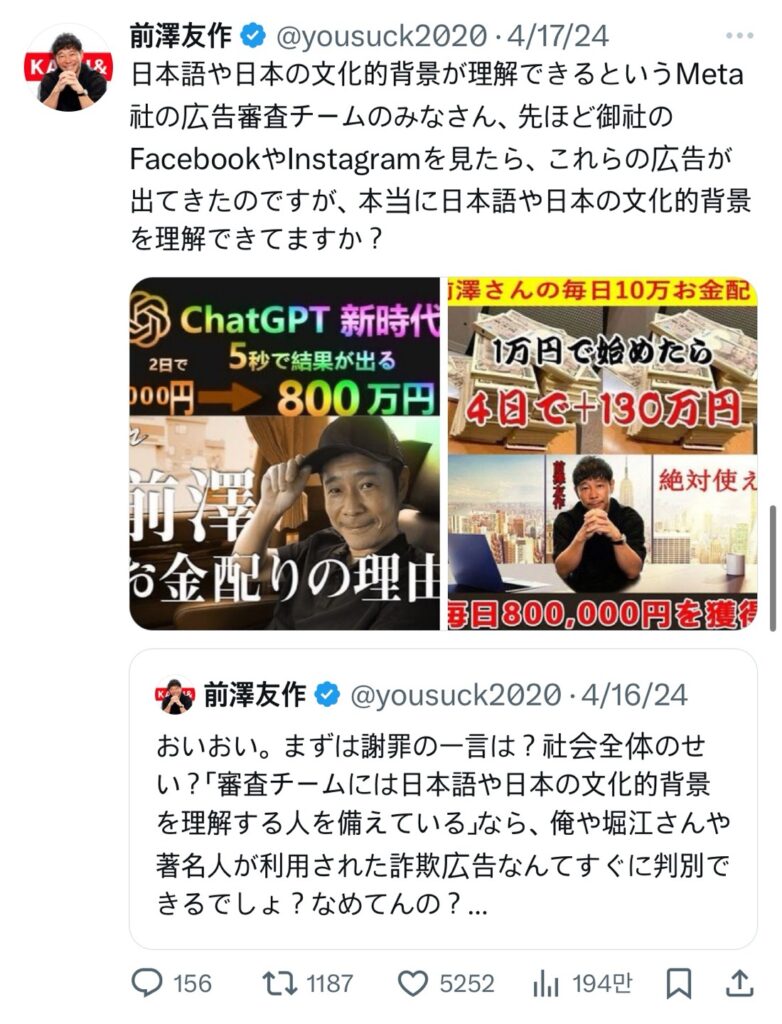
Victims who suffered financial losses due to investment advertisements impersonating celebrities in Japan filed a lawsuit against the social networking service platform where the advertisement was posted. The reason is that they neglected to investigate whether the advertisement was true. Defense lawyers say it is the first time in Japan that a lawsuit is filed asking the responsibility of a platform operator over the issue.
According to Kyodo News and NHK on the 26th, four men and women living in Kobe City and Tokyo filed a lawsuit against the Japanese subsidiary of Mi Mehta, the operator of the SNS platform, to the Kobe District Court for damages of about 23 million yen. Recently, in Japan, there have been a series of crimes in which people disguised themselves as the relevant person using the name and photo of a celebrity and then recommended investment to extort money, and the damage has been increasing. Plaintiffs saw fake investment advertisements on Meta and Instagram featuring Yusaku Maezawa, the founder of Japan’s famous clothing sales giant “ZOZO,” and Hiroyuki Nishimura, the founder of the Japanese version of Dish Inside, a community site “2ch,” and sent money to a designated account after being encouraged to invest by a person who self-proclaimed their secretary on the messenger line (LINE).
Plaintiffs claim that Meta suffered damage because it did not properly investigate false advertisements. Although the posting of false advertisements on SNS may expose many users to unexpected damage, Meta neglected its duty to investigate and confirm the truthfulness of the advertisement content in preparation for this, and only earned advertising fees. NHK cited the lawyers in the lawsuit and explained, “This is the first trial in Korea to hold the operator accountable for the issue amid a series of related fraud damages.”

According to the Japanese National Police Agency, the total number of damages from false advertisements on social media, which are famous people, totaled 2,271 last year, with the amount reaching about 27.79 billion yen. As the damage has increased, the political circle is also discussing countermeasures. The ruling Liberal Democratic Party recently shared the situation at a study meeting within its party and discussed concrete countermeasures. Maezawa, the person used in the crime, attended the meeting and asked the government to review legislative measures, including collecting information on (damage and actual conditions) in earnest and imposing responsibility on business operators.
As the controversy spread, Meta issued a statement on the 16th of this month, saying, “We are improving the detection system to respond to fraudulent advertising methods, and the judging team is also seeking to connect with the police with people who understand the Japanese language, cultural background, and nuances of Japan.” In response, Maezawa posted a photo of his impersonation investment ad posted on Meta and Instagram on his SNS, X, and said, “Meta’s advertising review team, you can understand Japanese or cultural background, and I just saw this advertisement on your Facebook and Instagram. Do you really understand Japanese and its cultural background?”
Many people use social networks to watch and buy advertisements there. Crimes are also increasing because policies are not clear compared to the use of many users. As the use of social networks increases, not only companies but also countries must create clear policies to prevent victims.
EJ SONG
US ASIA JOURNAL



